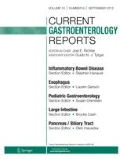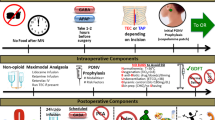Abstract
Purpose of Review
Individual elements in enhanced recovery pathways may be associated with specific complication risks. In this review, we highlight three areas of controversy surrounding complications in enhanced recovery: (1) whether enhanced recovery is associated with increased rates of acute kidney injury, (2) whether NSAID use is associated with anastomotic leaks, and (3) whether early urinary catheter removal is justified following colorectal surgery.
Recent Findings
Acute kidney injury has been reported at several institutions following implementation of enhanced recovery pathways highlighting the importance of institutional data tracking. NSAID use has been implicated in anastomotic leak rates for non-elective colorectal procedures, and criteria for its use should be implemented. Early urinary catheter removal has been supported despite increased urinary retention rates in order to decrease urinary tract infections.
Summary
Enhanced recovery protocols will continue to evolve, and risk profiles associated with individual elements should continue to be evaluated.
Similar content being viewed by others
References
Papers of particular interest, published recently, have been highlighted as: • Of importance
Ljungqvist O, Scott M, Fearon KC. Enhanced recovery after surgery: a review. JAMA surgery. 2017;152(3):292–8.
Merchea A, Larson DW. Enhanced recovery after surgery and future directions. Surg Clin North Am. 2018;98(6):1287–92.
Ni X, Jia D, Chen Y, Wang L, Suo J. Is the enhanced recovery after surgery (ERAS) program effective and safe in laparoscopic colorectal cancer surgery? A meta-analysis of randomized controlled trials. J Gastrointest Surg. 2019;23(7):1502–12.
Pisarska M, Pedziwiatr M, Malczak P, Major P, Ochenduszko S, Zub-Pokrowiecka A, et al. Do we really need the full compliance with ERAS protocol in laparoscopic colorectal surgery? A prospective cohort study. Int J Surg. 2016;36(Pt A):377–82.
Wahl TS, Goss LE, Morris MS, Gullick AA, Richman JS, Kennedy GD, et al. Enhanced recovery after surgery (ERAS) eliminates racial disparities in postoperative length of stay after colorectal surgery. Ann Surg. 2018;268(6):1026–35.
Hassinger TE, Mehaffey JH, Martin AN, Bauer-Nilsen K, Turrentine FE, Thiele RH, et al. Implementation of an enhanced recovery protocol is associated with on-time initiation of adjuvant chemotherapy in colorectal Cancer. Dis Colon Rectum. 2019;62(11):1305–15.
Ahmed J, Khan S, Lim M, Chandrasekaran TV, MacFie J. Enhanced recovery after surgery protocols - compliance and variations in practice during routine colorectal surgery. Color Dis. 2012;14(9):1045–51.
Memtsoudis SG, Poeran J, Kehlet H. Enhanced recovery after surgery in the United States: from evidence-based practice to uncertain science? JAMA. 2019;321(11):1049–50.
Horres CR, Adam MA, Sun Z, Thacker JK, Moon RE, Miller TE, et al. Enhanced recovery protocols for colorectal surgery and postoperative renal function: a retrospective review. Perioper Med (Lond). 2017;6:13.
Bellomo R, Ronco C, Kellum JA, Mehta RL, Palevsky P. Acute Dialysis quality initiative w. acute renal failure - definition, outcome measures, animal models, fluid therapy and information technology needs: the second international consensus conference of the acute dialysis quality initiative (ADQI) group. Crit Care. 2004;8(4):R204–12.
Khwaja A. KDIGO clinical practice guidelines for acute kidney injury. Nephron Clin Pract. 2012;120(4):c179–84.
Kork F, Balzer F, Spies CD, Wernecke KD, Ginde AA, Jankowski J, et al. Minor postoperative increases of creatinine are associated with higher mortality and longer hospital length of stay in surgical patients. Anesthesiology. 2015;123(6):1301–11.
Marcotte JH, Patel K, Desai R, Gaughan JP, Rattigan D, Cahill KW, et al. Acute kidney injury following implementation of an enhanced recovery after surgery (ERAS) protocol in colorectal surgery. Int J Color Dis. 2018;33(9):1259–67.
Koerner CP, Lopez-Aguiar AG, Zaidi M, Speegle S, Balch G, Shaffer VO, et al. Caution: increased acute kidney injury in enhanced recovery after surgery (ERAS) protocols. Am Surg. 2019;85(2):156–61.
Wiener JGD, Goss L, Wahl TS, Terry MA, Burge KG, Chu DI, et al. The Association of Enhanced Recovery Pathway and Acute Kidney Injury in patients undergoing colorectal surgery. Dis Colon Rectum. 2020;63(2):233–41.
Hassinger TE, Turrentine FE, Thiele RH, Sarosiek BM, McMurry TL, Friel CM, et al. Acute kidney injury in the age of enhanced recovery protocols. Dis Colon Rectum. 2018;61(8):946–54.
• Hawkins AT, MD ME, Wanderer JP, Ford MM, Hopkins MB, Muldoon RL, et al. Ketorolac Use and Anastomotic Leak in Elective Colorectal Surgery: A Detailed Analysis. Dis Colon Rectum. 2018;61(12):1426–34 Results showing ketorlac not associated with AKI or anastomotic leak in ERP for elective colorectal surgery when restricted by protocol criteria.
Biteker M, Dayan A, Tekkesin AI, Can MM, Tayci I, Ilhan E, et al. Incidence, risk factors, and outcomes of perioperative acute kidney injury in noncardiac and nonvascular surgery. Am J Surg. 2014;207(1):53–9.
Meersch M, Schmidt C, Zarbock A. Perioperative acute kidney injury: an under-recognized problem. Anesth Analg. 2017;125(4):1223–32.
Wahl TS, Graham LA, Morris MS, Richman JS, Hollis RH, Jones CE, et al. Association between preoperative proteinuria and postoperative acute kidney injury and readmission. JAMA surgery. 2018;153(9):e182009.
ACS NSQIP Participant Use Data File [Available from: https://www.facs.org/quality-programs/acs-nsqip/program-specifics/participant-use. Accessed 15 Jan 2020.
Schlachta CM, Burpee SE, Fernandez C, Chan B, Mamazza J, Poulin EC. Optimizing recovery after laparoscopic colon surgery (ORAL-CS): effect of intravenous ketorolac on length of hospital stay. Surg Endosc. 2007;21(12):2212–9.
• Hakkarainen TW, Steele SR, Bastaworous A, Dellinger EP, Farrokhi E, Farjah F, et al. Nonsteroidal Anti-inflammatory Drugs and the Risk for Anastomotic Failure: A Report From Washington State's Surgical Care and Outcomes Assessment Program (SCOAP). JAMA Surg. 2015;150(3):223–8 Results from statewide colloborative showing risk of NSAIDs for anastomotic leak mainly confined to non-elective colorectal surgery.
Van Koughnett JA, Wexner SD. Surgery. NSAIDs and risk of anastomotic leaks after colorectal surgery. Nat Rev Gastroenterol Hepatol. 2014;11(9):523–4.
Gorissen KJ, Benning D, Berghmans T, Snoeijs MG, Sosef MN, Hulsewe KW, et al. Risk of anastomotic leakage with non-steroidal anti-inflammatory drugs in colorectal surgery. Br J Surg. 2012;99(5):721–7.
Klein M, Gogenur I, Rosenberg J. Postoperative use of non-steroidal anti-inflammatory drugs in patients with anastomotic leakage requiring reoperation after colorectal resection: cohort study based on prospective data. BMJ. 2012;345:e6166.
Subendran J, Siddiqui N, Victor JC, McLeod RS, Govindarajan A. NSAID use and anastomotic leaks following elective colorectal surgery: a matched case-control study. J Gastrointest Surg. 2014;18(8):1391–7.
Saleh F, Jackson TD, Ambrosini L, Gnanasegaram JJ, Kwong J, Quereshy F, et al. Perioperative nonselective non-steroidal anti-inflammatory drugs are not associated with anastomotic leakage after colorectal surgery. J Gastrointest Surg. 2014;18(8):1398–404.
Paulasir S, Kaoutzanis C, Welch KB, Vandewarker JF, Krapohl G, Lampman RM, et al. Nonsteroidal anti-inflammatory drugs: do they increase the risk of anastomotic leaks following colorectal operations? Dis Colon Rectum. 2015;58(9):870–7.
Kotagal M, Hakkarainen TW, Simianu VV, Beck SJ, Alfonso-Cristancho R, Flum DR. Ketorolac use and postoperative complications in gastrointestinal surgery. Ann Surg. 2016;263(1):71–5.
Huang Y, Tang SR, Young CJ. Nonsteroidal anti-inflammatory drugs and anastomotic dehiscence after colorectal surgery: a meta-analysis. ANZ J Surg. 2018;88(10):959–65.
Benoist S, Panis Y, Denet C, Mauvais F, Mariani P, Valleur P. Optimal duration of urinary drainage after rectal resection: a randomized controlled trial. Surgery. 1999;125(2):135–41.
Kwaan MR, Lee JT, Rothenberger DA, Melton GB, Madoff RD. Early removal of urinary catheters after rectal surgery is associated with increased urinary retention. Dis Colon Rectum. 2015;58(4):401–5.
Okrainec A, Aarts MA, Conn LG, McCluskey S, McKenzie M, Pearsall EA, et al. Compliance with urinary catheter removal guidelines leads to improved outcome in enhanced recovery after surgery patients. J Gastrointest Surg. 2017;21(8):1309–17.
Grass F, Slieker J, Frauche P, Sola J, Blanc C, Demartines N, et al. Postoperative urinary retention in colorectal surgery within an enhanced recovery pathway. J Surg Res. 2017;207:70–6.
Ghuman A, Kasteel N, Karimuddin AA, Brown CJ, Raval MJ, Phang PT. Urinary retention in early urinary catheter removal after colorectal surgery. Am J Surg. 2018;215(5):949–52.
Schreiber A, Aydil E, Walschus U, Glitsch A, Patrzyk M, Heidecke CD, et al. Early removal of urinary drainage in patients receiving epidural analgesia after colorectal surgery within an ERAS protocol is feasible. Langenbeck's Arch Surg. 2019;404(7):853–63.
Zmora O, Madbouly K, Tulchinsky H, Hussein A, Khaikin M. Urinary bladder catheter drainage following pelvic surgery--is it necessary for that long? Dis Colon Rectum. 2010;53(3):321–6.
Rosen DR, Wolfe RC, Damle A, Atallah C, Chapman WC Jr, Vetter JM, et al. Thoracic epidural analgesia: does it enhance recovery? Dis Colon Rectum. 2018;61(12):1403–9.
Wiener JG, Gunnells D, Wood L, Chu DI, Cannon J, Kennedy GD, et al. Early removal of catheters in an enhanced recovery pathway (ERP) with intrathecal opioid injection does not affect postoperative urinary outcomes. Am J Surg. 2019. https://doi.org/10.1016/j.amjsurg.2019.09.023.
• Patel DN, Felder SI, Luu M, Daskivich TJ, NZ K, Fleshner P. Early Urinary Catheter Removal Following Pelvic Colorectal Surgery: A Prospective, Randomized, Noninferiority Trial. Dis Colon Rectum. 2018;61(10):1180–6 Randomized non-inferiority trial showing early catheter removal in pelvic surgery is not inferior to delayed removal.
Lee Y, McKechnie T, Springer JE, Doumouras AG, Hong D, Eskicioglu C. Optimal timing of urinary catheter removal following pelvic colorectal surgery: a systematic review and meta-analysis. Int J Color Dis. 2019;34(12):2011–21.
Carmichael JC, Keller DS, Baldini G, Bordeianou L, Weiss E, Lee L, et al. Clinical practice guidelines for enhanced recovery after colon and rectal surgery from the American Society of Colon and Rectal Surgeons and Society of American Gastrointestinal and Endoscopic Surgeons. Dis Colon Rectum. 2017;60(8):761–84.
Author information
Authors and Affiliations
Corresponding author
Ethics declarations
Conflict of Interest
The authors declare that they have no conflicts of interest.
Human and Animal Rights and Informed Consent
This article does not contain any studies with human or animal subjects performed by any of the authors.
Additional information
Publisher’s Note
Springer Nature remains neutral with regard to jurisdictional claims in published maps and institutional affiliations.
This article is part of the Topical Collection on Large Intestine
Rights and permissions
About this article
Cite this article
Hollis, R.H., Kennedy, G.D. Postoperative Complications After Colorectal Surgery: Where Are We in the Era of Enhanced Recovery?. Curr Gastroenterol Rep 22, 26 (2020). https://doi.org/10.1007/s11894-020-00763-5
Published:
DOI: https://doi.org/10.1007/s11894-020-00763-5




